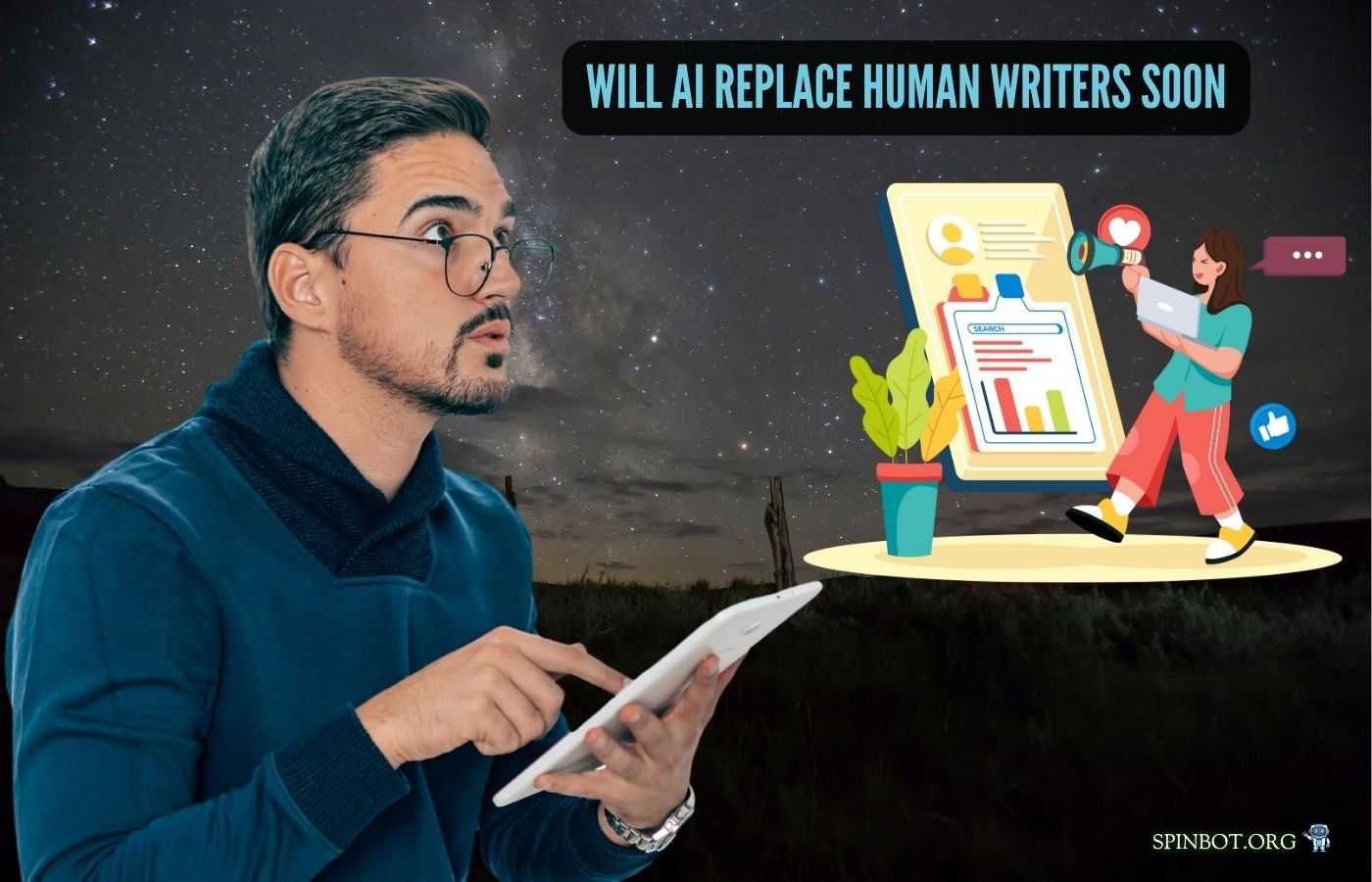The rise of artificial intelligence (AI) in various industries has led to a significant transformation in how we approach tasks, from manufacturing to content creation. But one burning question has been persistently raised: Will AI Replace Human Writers Soon? As AI continues to evolve, this concern grows, especially in the realm of writing. In this article, we will explore the current landscape of AI in writing, the potential impacts it has on human writers, and the challenges AI faces in fully replacing them.
The Current State of AI in Content Writing
AI’s role in content creation has been steadily increasing. Tools powered by AI, such as OpenAI’s GPT models, are now widely used to generate articles, blog posts, social media content, and more. These AI models are trained to mimic human writing styles by processing large datasets and predicting the next words or sentences based on patterns in the data.
AI Tools in Writing
AI is already being used to streamline and automate content creation. Some of the most popular AI tools include:
- GPT-3: A language model capable of generating human-like text.
- Jasper: AI-based copywriting software that assists in generating blog posts, ad copies, and social media content.
- Quillbot: A paraphrasing tool that helps in rewriting content to make it more engaging or varied.
- Writesonic: A tool designed to generate SEO-optimized content based on given prompts.
These tools significantly reduce the time spent on drafting and editing, providing businesses with an efficient way to produce content. However, the question remains: Can AI ever fully replace human creativity in writing?
Can AI Replace Human Creativity in Writing?
AI has proven to be a powerful tool, but can it truly replace the creativity that human writers bring to the table? The simple answer is no AI lacks the depth of creative thinking and emotional intelligence that human writers possess. While AI can generate text based on patterns and algorithms, it struggles with creativity and originality. Human writers can weave together complex ideas, add unique perspectives, and infuse their work with emotion, something AI can’t replicate just yet.
The Advantages of AI in Writing
AI offers numerous benefits to content creators and businesses, making it an attractive option for those looking to streamline their writing processes. Here are the main advantages:
1. Speed and Efficiency
AI can generate text much faster than humans. For example, AI tools can produce an entire article in minutes, a task that would take human writers hours. This speed is beneficial in industries that require quick content production, such as news outlets and digital marketing.
- Example: Media companies have started using AI to write reports on sports events, financial markets, and breaking news stories in real time.
2. Scalability
AI allows businesses to produce content at scale. Whether it’s hundreds of product descriptions for an e-commerce website or daily blog posts for a content-heavy site, AI can quickly generate large volumes of text without compromising quality.
- Example: Large e-commerce websites use AI to create personalized product descriptions, making it possible to handle an extensive inventory with minimal human effort.
3. Cost-Effectiveness
The cost of hiring human writers, editors, and proofreaders can be substantial. AI, on the other hand, can reduce the need for extensive human involvement, especially in areas like content generation and SEO optimization. Businesses can invest in AI tools to handle the bulk of the content creation process, reducing operational costs.
4. Consistency
AI doesn’t suffer from writer’s block or fatigue, which means it can produce consistent content without breaks. This can be particularly useful for brands that need to maintain a consistent voice across all their platforms.
- Example: AI tools can be programmed to write in a specific tone or style, ensuring that all content matches the brand’s voice, whether it’s for social media posts or blog articles.
The Limitations of AI in Writing
While AI has shown impressive capabilities, there are still several limitations that hinder its ability to replace human writers entirely.
1. Lack of Creativity and Emotional Intelligence
AI is limited to the data it has been trained on. It cannot come up with truly original ideas or create content with emotional depth. For example, AI can write about a topic but will likely miss the emotional appeal and human experience that a human writer can bring to the table.
2. Understanding Complex Contexts
AI struggles with understanding the deeper context of certain topics. It might generate accurate information, but it may not fully understand the implications of what it is writing. For example, when writing on sensitive subjects like mental health or social issues, human writers can approach the topic with empathy and understanding, something AI cannot replicate.
- Example: A human writer can craft a powerful narrative about mental health, using their personal experiences or insights, while AI would likely provide generic and surface-level content.
3. Voice and Tone
One of the distinguishing factors of human writing is its unique voice. Human writers inject their personality into their work, making it more relatable and engaging. AI lacks this personal touch, which is often critical in creating content that resonates with readers.
4. Ethical Concerns
AI-generated content also raises ethical questions. Who owns the content created by AI? Is it plagiarism if AI is trained on publicly available content? These are concerns that need addressing as AI becomes more integrated into content creation.
The Role of Human Writers in the Future
Although AI is making strides in writing, human writers still hold an important role in the future of content creation. Here’s why:
1. Human Creativity and Perspective
AI can analyze data and generate content, but it cannot generate truly creative ideas. Human writers bring unique experiences, perspectives, and emotional depth to their writing. This is especially crucial in fields such as fiction, storytelling, and opinion pieces, where creativity is key.
- Example: Novels, screenplays, and even marketing copy often require an emotional connection with the reader. Human writers excel at creating these connections.
2. The Need for Human Oversight
Even though AI can produce drafts or generate text, human oversight is still needed. Human editors ensure that AI-generated content aligns with the intended message, tone, and quality standards. They also make sure the content is fact-checked, avoiding potential errors that AI might overlook.
3. The Importance of Voice
A strong and consistent voice is one of the key elements of writing that distinguishes one writer from another. Human writers can create a voice that aligns with the target audience’s preferences, which is essential in content marketing, blogging, and freelance writing.
4. Niche Areas Where Human Writers Shine
Certain types of writing will always require human intervention, including areas like:
- Opinion Pieces: Expressing personal views or controversial takes requires a human perspective.
- Deep-Dive Analysis: Human writers can synthesize complex ideas and create in-depth articles that require critical thinking and expertise.
- Creative Writing: Fiction, poetry, and other creative genres rely heavily on human imagination and emotional depth.
AI and Human Collaboration: A Symbiotic Relationship
Rather than replacing human writers, AI is likely to become a powerful tool that complements their work. The future of content creation may involve a hybrid approach, where AI handles routine or repetitive tasks, and human writers focus on creativity, strategy, and high-level decision-making.
AI-Assisted Writing Workflow
One practical example of AI and human collaboration is the use of AI in drafting articles, with humans providing the final touch. AI can generate a draft, while human writers focus on refining the content, adding a personal touch, and ensuring the quality is up to par.
- Example: A blogger might use AI to generate content ideas, write an outline, and produce a first draft. The human writer would then revise the article, ensuring it aligns with their voice and adding any necessary research or personal insights.
AI for SEO Optimization
Another way AI can aid human writers is by assisting with SEO tasks. Tools like Surfer SEO and Yoast help writers optimize their content for search engines, ensuring it ranks higher in search results.
- Example: AI can suggest keywords, optimize meta descriptions, and ensure that content is structured according to SEO best practices, making the writing process faster and more efficient.
How Will AI Affect Writers?
The rise of AI in writing has sparked mixed reactions among writers. While some see it as a valuable tool, others worry about job displacement and the loss of personal touch in writing.
1. AI Taking Over Writing Jobs
The fear of AI replacing human writers has sparked debates within the writing community. Many worry that AI will take over freelance writing, content creation, and even journalism, reducing opportunities for human writers.
- Example: AI-driven tools like Jasper are already being used by marketers to create blog posts and advertisements at scale, which can lead to fewer jobs for entry-level content writers.
2. Upskilling for Writers
As AI tools become more prevalent, writers will need to adapt by learning how to work with these technologies. Writers who can integrate AI into their workflow will be more competitive and have a distinct advantage.
3. Why Are Writers Worried About AI?
The fear of obsolescence is a real concern. Many writers believe that as AI improves, it may become more difficult to differentiate between human and machine-generated content. This could impact the value of human writers in the market.
- Example: Journalists are concerned that AI tools might replace news reporting, especially in areas like finance and sports, where AI can quickly generate factual reports based on data.
Conclusion
While AI has made significant strides in content creation, it is unlikely that it will fully replace human writers anytime soon. AI is an invaluable tool that can help writers with efficiency, scalability, and SEO optimization. However, it lacks the creativity, emotional intelligence, and human touch that make writing truly unique. Instead of replacing human writers, AI is more likely to complement their work, allowing them to focus on creativity, strategy, and high-level decision-making.
For now, writers should embrace AI as a tool to enhance their work, while focusing on the aspects of writing that AI cannot replicate: creativity, emotional depth, and originality. The future of content creation will likely involve collaboration between humans and machines, resulting in more efficient, engaging, and high-quality content.

AI writing strategist with hands-on NLP experience, Liam simplifies complex topics into bite-sized brilliance. Trusted by thousands for actionable, future-forward content you can rely on.

